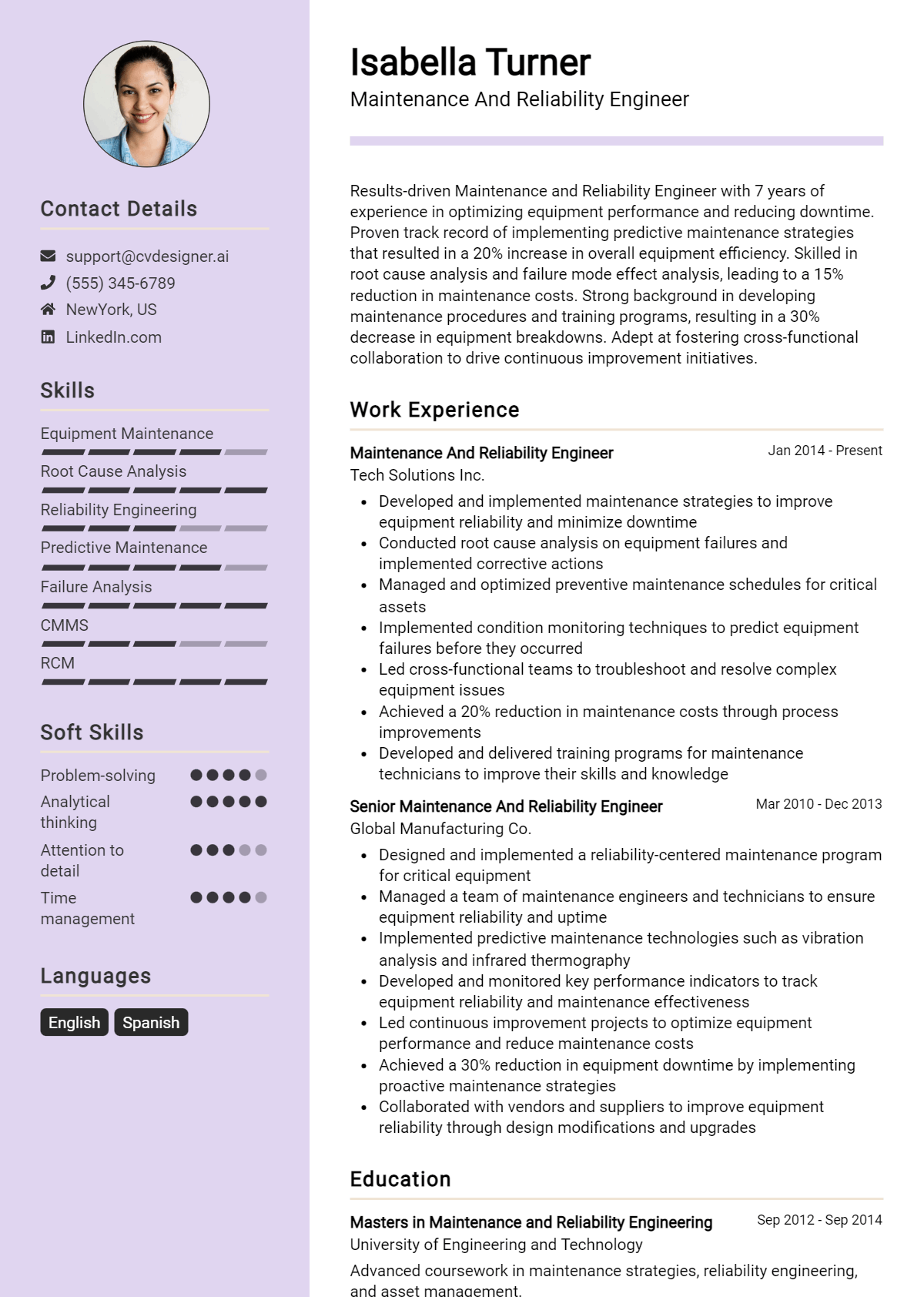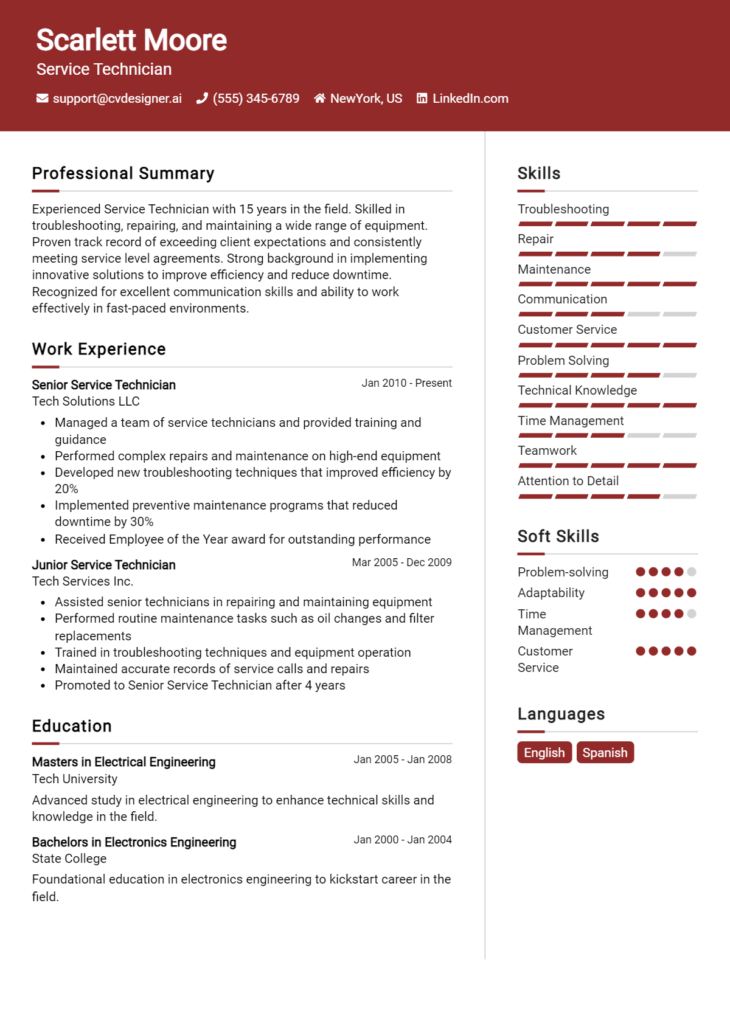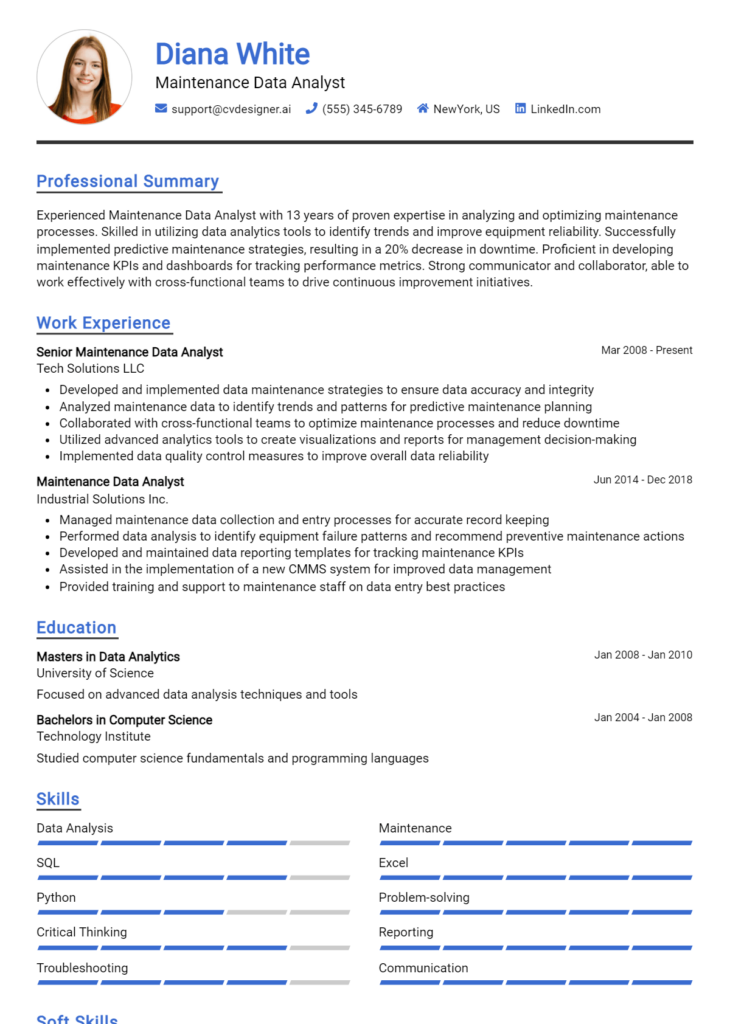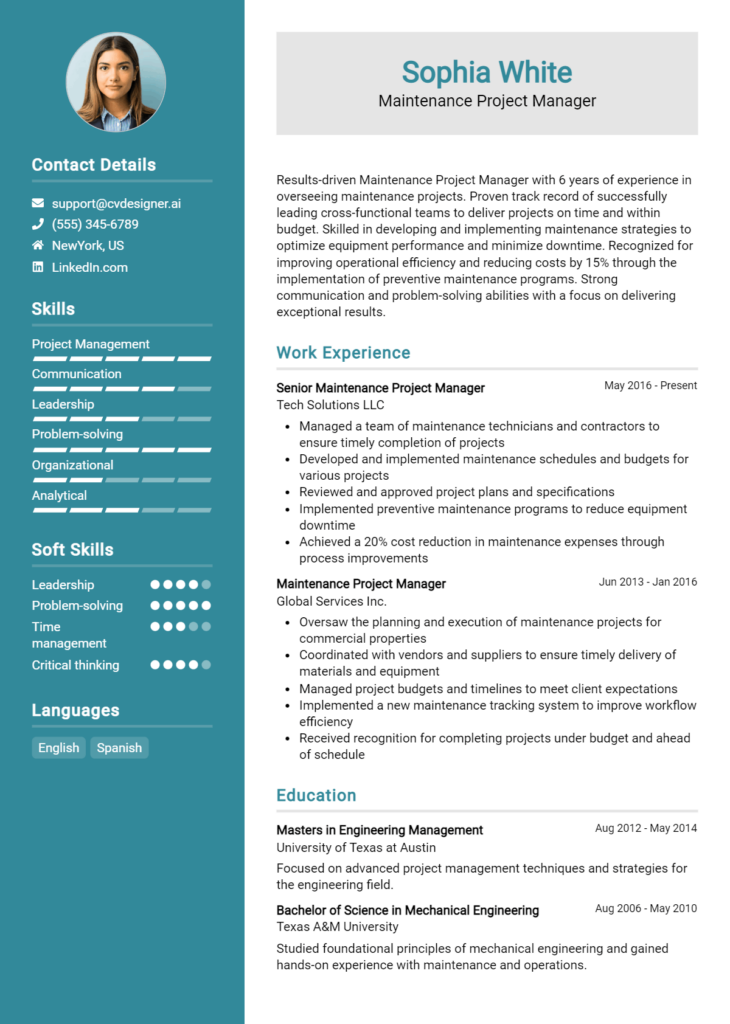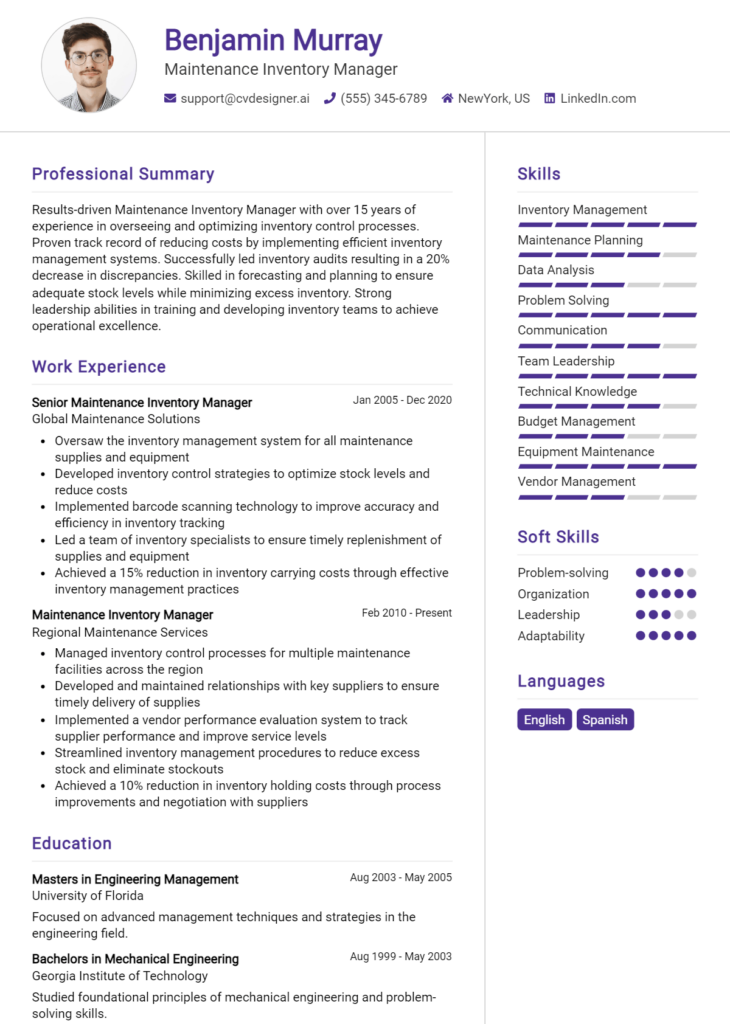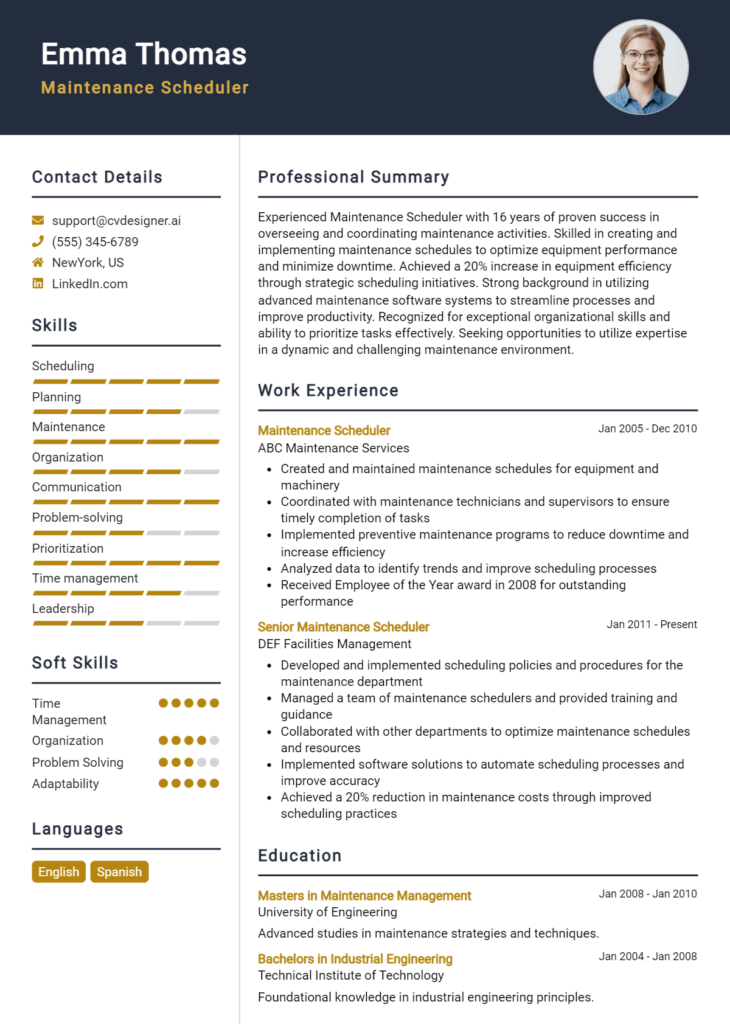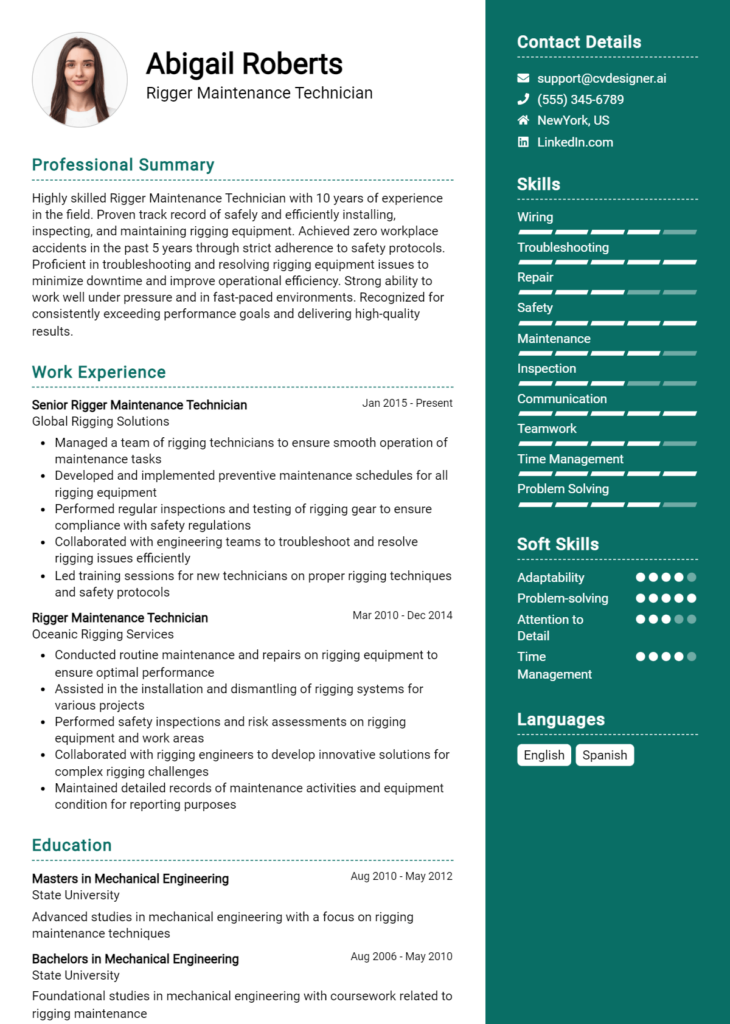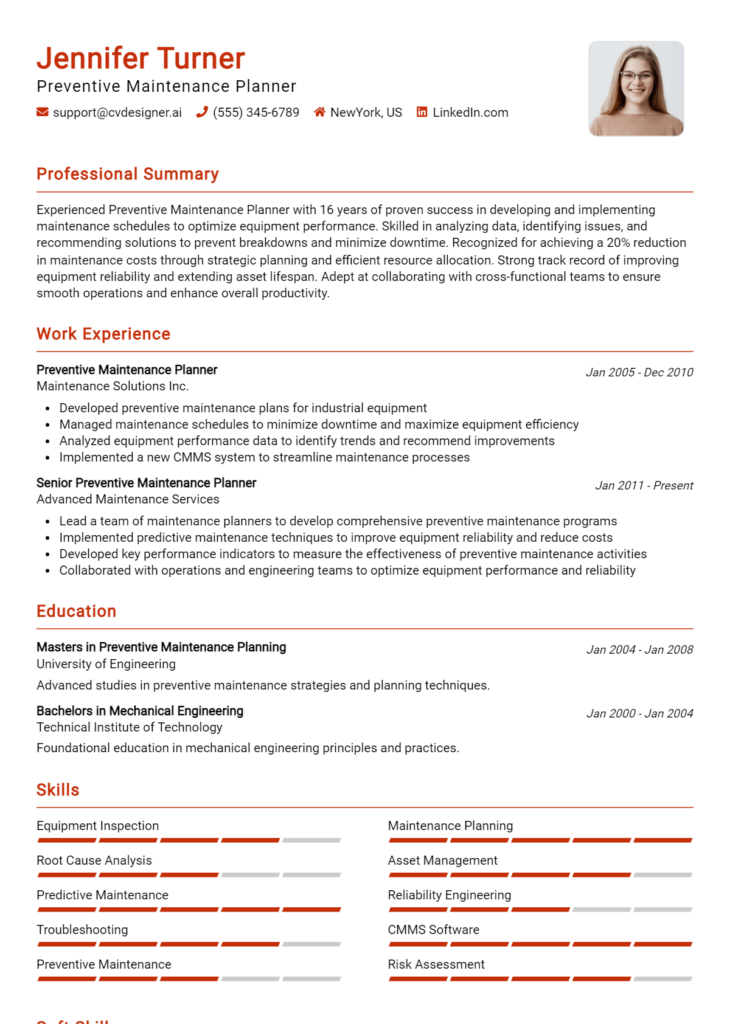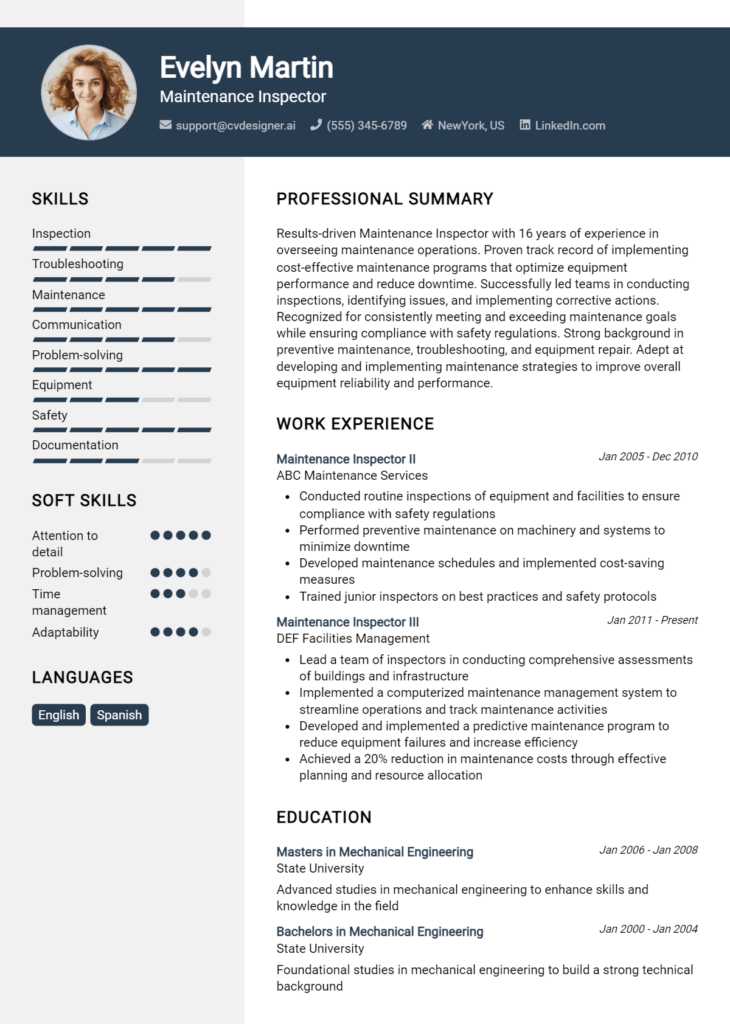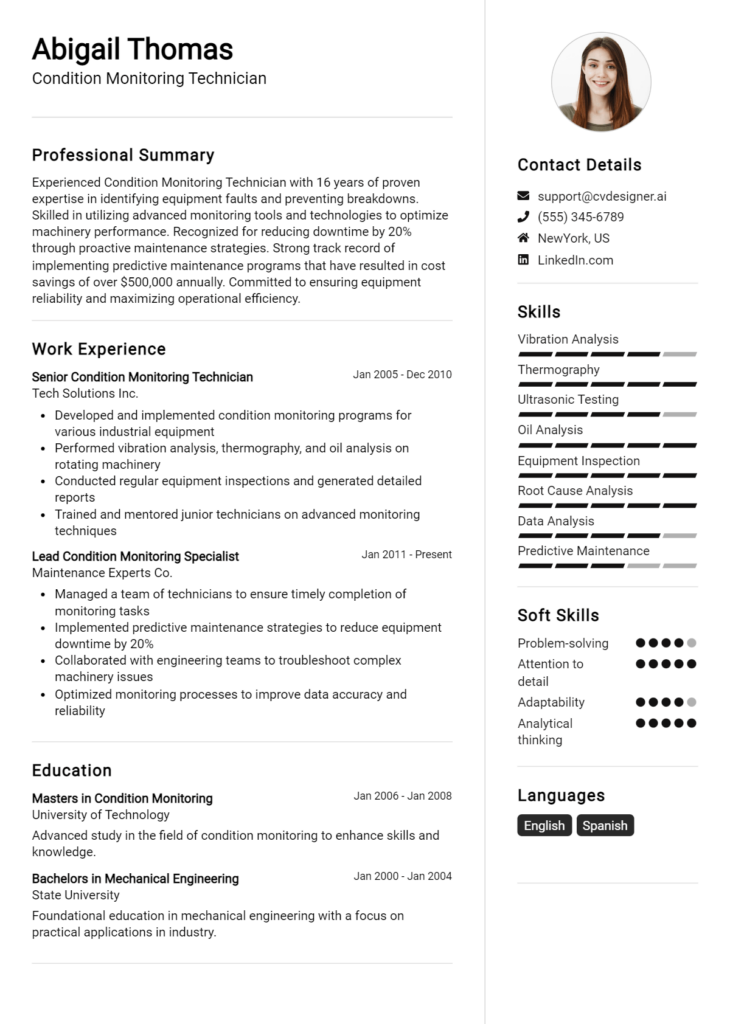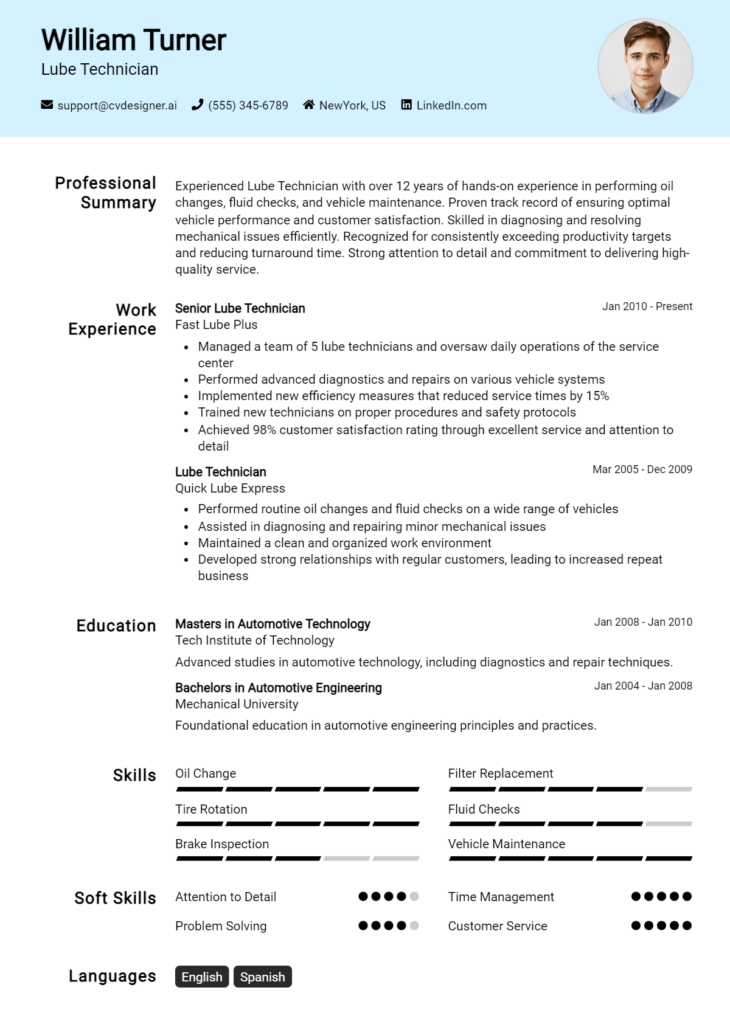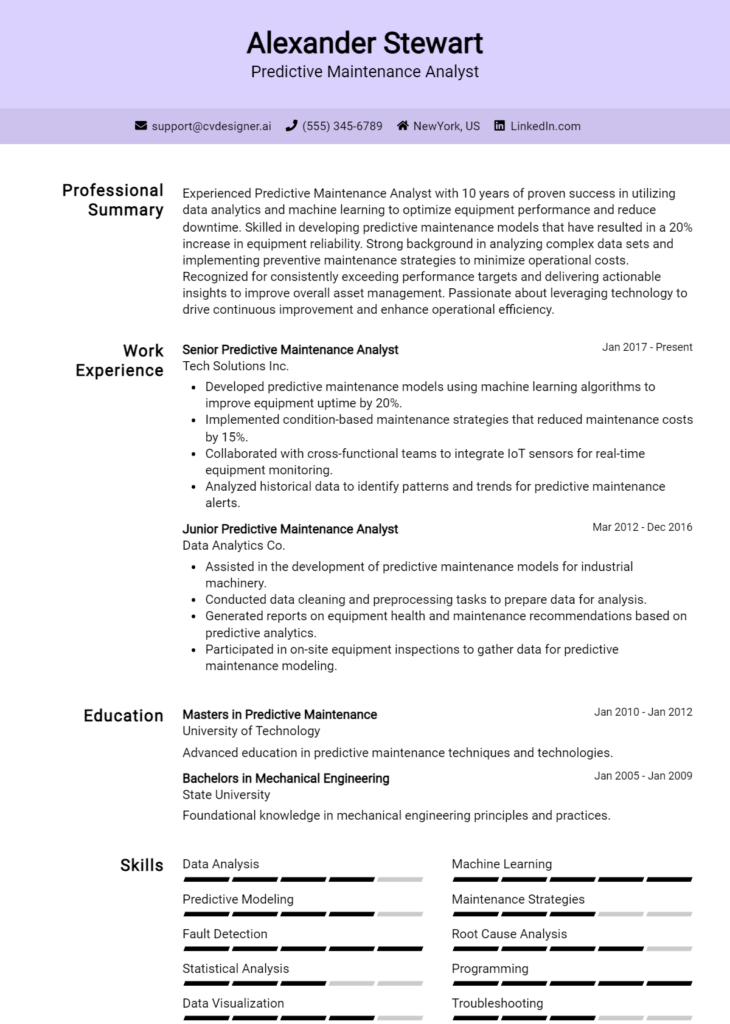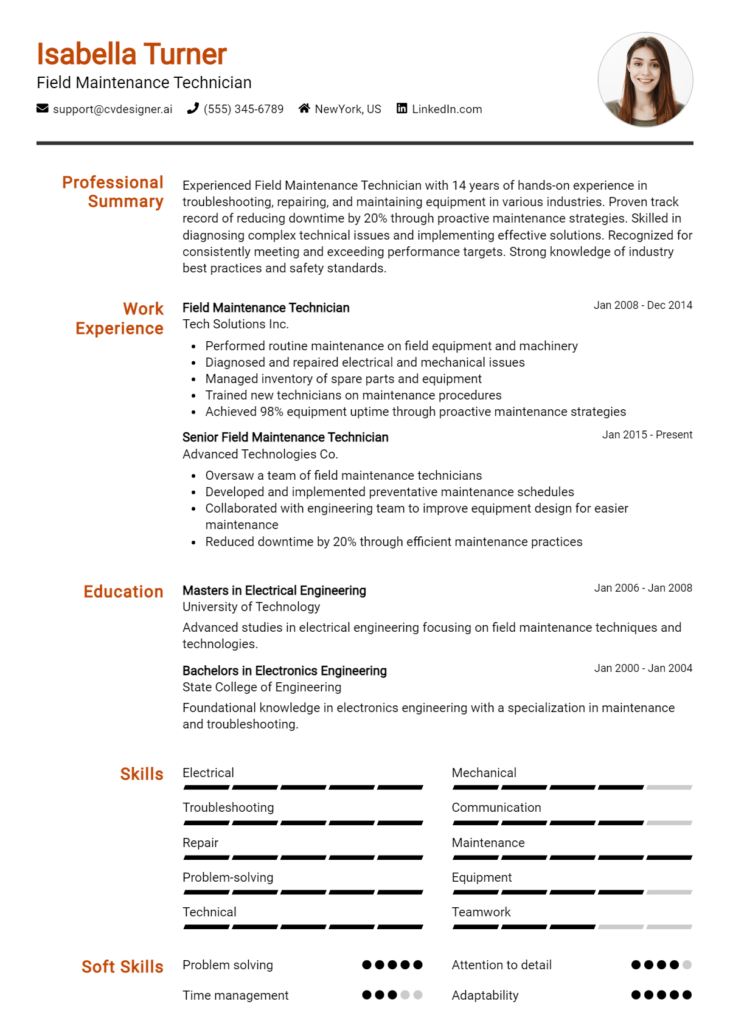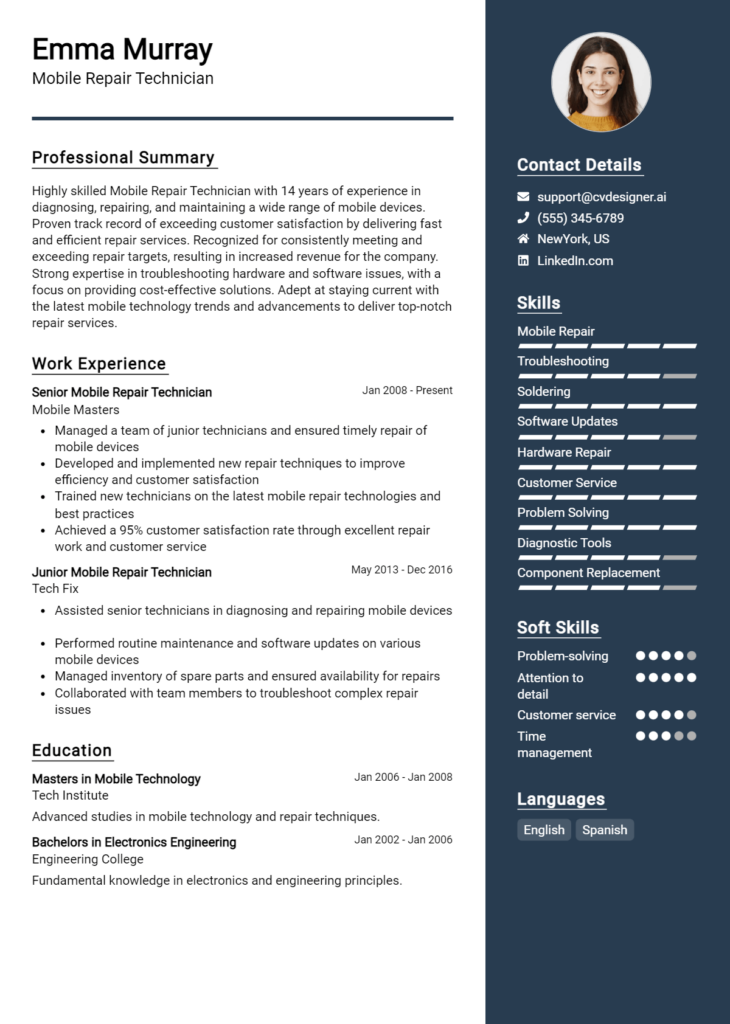Maintenance and Reliability Engineer Core Responsibilities
A Maintenance and Reliability Engineer plays a crucial role in ensuring optimal performance and longevity of equipment within an organization. Their core responsibilities include conducting reliability analyses, implementing maintenance strategies, and collaborating across departments such as operations, engineering, and safety. Key skills encompass technical expertise, operational efficiency, and strong problem-solving capabilities. These competencies contribute significantly to minimizing downtime and enhancing productivity, making a well-structured resume vital for demonstrating these qualifications to potential employers.
Common Responsibilities Listed on Maintenance and Reliability Engineer Resume
- Conducting failure analysis and root cause investigations.
- Developing and implementing preventive and predictive maintenance programs.
- Collaborating with cross-functional teams to enhance equipment reliability.
- Analyzing maintenance data to identify trends and areas for improvement.
- Creating and maintaining maintenance documentation and reports.
- Training staff on best maintenance practices and safety protocols.
- Utilizing reliability-centered maintenance (RCM) principles.
- Conducting risk assessments related to equipment failures.
- Coordinating with suppliers for equipment upgrades and repairs.
- Participating in continuous improvement initiatives.
- Monitoring and managing maintenance budgets and resources.
- Implementing condition monitoring technologies to assess equipment health.
High-Level Resume Tips for Maintenance and Reliability Engineer Professionals
In today's competitive job market, a well-crafted resume is essential for Maintenance and Reliability Engineer professionals looking to make a lasting impression on potential employers. Your resume serves as your first point of contact with hiring managers, and it needs to effectively showcase your skills, experiences, and achievements in a compelling manner. A strong resume not only highlights your technical abilities but also reflects your problem-solving capabilities and your contributions to improving operational efficiency. This guide will provide practical and actionable resume tips specifically tailored for Maintenance and Reliability Engineer professionals, ensuring you stand out from the competition.
Top Resume Tips for Maintenance and Reliability Engineer Professionals
- Tailor your resume to the specific job description by incorporating relevant keywords and phrases.
- Highlight your technical skills prominently, including software and tools commonly used in maintenance and reliability engineering.
- Showcase your relevant experience, focusing on projects that demonstrate your ability to enhance system reliability and reduce downtime.
- Quantify your achievements with specific metrics, such as percentage improvements in equipment uptime or cost savings from maintenance initiatives.
- Include certifications and training that are pertinent to the field, such as Six Sigma, Reliability Engineer certification, or maintenance management courses.
- Utilize a clear and professional format that enhances readability and emphasizes key information.
- Incorporate industry terminology to demonstrate familiarity with best practices and standards in maintenance and reliability engineering.
- Keep your resume concise, ideally to one or two pages, ensuring that only relevant information is included.
- Utilize action verbs to describe your responsibilities and achievements, making your contributions sound impactful.
- Consider including a summary or objective statement at the top of your resume that outlines your career goals and what you bring to the table.
Implementing these tips can significantly enhance your chances of landing a job in the Maintenance and Reliability Engineer field. A well-structured resume that effectively communicates your qualifications not only captures the attention of hiring managers but also positions you as a strong candidate capable of driving operational excellence and reliability in any organization.
Why Resume Headlines & Titles are Important for Maintenance and Reliability Engineer
In the competitive field of Maintenance and Reliability Engineering, a well-crafted resume headline or title can serve as a powerful first impression for hiring managers. These headlines are critical as they encapsulate a candidate's core qualifications, making it easier for recruiters to quickly gauge the applicant's suitability for the role. A strong headline should be concise, relevant, and tailored to the specific job being applied for, effectively summarizing the candidate's unique skills and experiences in a single impactful phrase. By doing so, it can significantly increase the chances of catching the attention of hiring managers and prompting them to delve deeper into the resume.
Best Practices for Crafting Resume Headlines for Maintenance and Reliability Engineer
- Keep it concise: Aim for a headline that is no more than 10-15 words.
- Be specific: Use terminology that directly relates to Maintenance and Reliability Engineering.
- Highlight key strengths: Focus on your most relevant skills or achievements.
- Tailor for the job: Customize the headline for each position you apply to.
- Use action words: Start with strong verbs to convey a sense of proactivity.
- Incorporate industry keywords: Use keywords that are relevant to the role and industry.
- Avoid jargon: Ensure that the language is clear and easily understood by non-technical readers.
- Showcase results: If possible, highlight quantifiable achievements or outcomes.
Example Resume Headlines for Maintenance and Reliability Engineer
Strong Resume Headlines
"Certified Maintenance and Reliability Engineer with 10+ Years of Experience in Asset Optimization"
“Proven Track Record in Reducing Downtime by 30% Through Innovative Maintenance Strategies”
“Results-Driven Engineer Specializing in Predictive Maintenance and Reliability Improvement”
“Expert in Implementing CMMS Solutions to Enhance Operational Efficiency”
Weak Resume Headlines
“Engineer Looking for Opportunities”
“Maintenance Professional with Experience”
The strong headlines are effective because they communicate specific skills, relevant experience, and tangible results that directly align with the expectations of hiring managers in the Maintenance and Reliability Engineering sector. They present the candidate as an asset with a proven track record, prompting further interest. In contrast, the weak headlines lack specificity and fail to convey any real value or expertise, making them forgettable and less likely to captivate the reader's attention.
Writing an Exceptional Maintenance and Reliability Engineer Resume Summary
A well-crafted resume summary is essential for a Maintenance and Reliability Engineer as it serves as the first impression for hiring managers. This concise overview quickly highlights key skills, relevant experience, and significant accomplishments that align with the job role, making it easier for employers to gauge a candidate's suitability. An impactful summary not only captures attention but also sets the tone for the rest of the resume, demonstrating the candidate's value in a competitive job market. Tailoring the summary to the specific job description ensures that it resonates with what the employer is seeking, maximizing the candidate's chances of landing an interview.
Best Practices for Writing a Maintenance and Reliability Engineer Resume Summary
- Quantify Achievements: Use numbers and metrics to showcase the impact of your contributions.
- Focus on Relevant Skills: Highlight specific technical skills and competencies that are directly applicable to the role.
- Tailor to the Job Description: Customize your summary to reflect the keywords and qualifications mentioned in the job posting.
- Be Concise: Keep the summary brief, ideally between 3-5 sentences, to maintain the reader's interest.
- Use Action Verbs: Start sentences with strong action verbs to convey confidence and proactivity.
- Highlight Industry Experience: Mention years of experience and types of industries worked in to establish credibility.
- Showcase Problem-Solving Abilities: Emphasize your capability to identify issues and implement effective solutions.
- Include Certifications: If applicable, mention relevant certifications that enhance your qualifications for the role.
Example Maintenance and Reliability Engineer Resume Summaries
Strong Resume Summaries
Results-driven Maintenance and Reliability Engineer with over 8 years of experience in optimizing equipment performance and reducing downtime by 30%. Proficient in predictive maintenance techniques and root cause analysis, having successfully implemented a proactive maintenance strategy that enhanced operational efficiency in a manufacturing environment.
Dedicated Maintenance Engineer with a proven track record of increasing asset reliability by 25% through effective maintenance planning and execution. Skilled in utilizing advanced diagnostic tools and methodologies to identify and resolve equipment failures, ensuring minimal disruption to production processes.
Experienced Reliability Engineer with 10+ years in the oil and gas industry, specializing in reliability-centered maintenance (RCM) strategies. Achieved a 40% reduction in maintenance costs while improving equipment reliability metrics, directly contributing to enhanced safety and compliance standards.
Weak Resume Summaries
Maintenance Engineer with some experience in various industries. I work well with teams and can help improve processes.
Reliability Engineer looking for a new opportunity. Skilled in maintenance and have a background in engineering.
The strong resume summaries are effective because they provide specific, quantifiable outcomes, detail relevant skills, and demonstrate direct alignment with the responsibilities of a Maintenance and Reliability Engineer. In contrast, the weak summaries lack precision, offer vague statements, and fail to highlight any measurable achievements, making them less impactful to hiring managers.
Work Experience Section for Maintenance and Reliability Engineer Resume
The work experience section of a Maintenance and Reliability Engineer resume is critical, as it serves as a platform for candidates to demonstrate their technical skills, leadership capabilities, and commitment to delivering high-quality products. This section provides prospective employers with insight into the candidate's ability to manage teams, optimize processes, and contribute to the overall reliability of systems and equipment. By quantifying achievements and aligning their experience with industry standards, candidates can effectively showcase their value in improving operational efficiency and reducing downtime.
Best Practices for Maintenance and Reliability Engineer Work Experience
- Highlight relevant technical skills and certifications specific to maintenance and reliability engineering.
- Quantify achievements with specific metrics, such as percentages of downtime reduction or cost savings.
- Emphasize leadership roles and teamwork experiences, showcasing collaboration with cross-functional teams.
- Use industry-standard terminology to align your experience with the expectations of potential employers.
- Detail specific projects and initiatives that led to improvements in system reliability and performance.
- Incorporate problem-solving examples that illustrate your analytical skills and proactive approach.
- Tailor your experience to match the job description of the position you are applying for.
- Focus on continuous improvement efforts, including the implementation of preventive maintenance strategies.
Example Work Experiences for Maintenance and Reliability Engineer
Strong Experiences
- Led a cross-functional team in a project that achieved a 30% reduction in equipment downtime through the implementation of a predictive maintenance program.
- Developed and executed a reliability-centered maintenance strategy that resulted in annual savings of $150,000 in maintenance costs.
- Managed the successful installation of a new automated monitoring system, enhancing real-time data reporting and improving response times by 25%.
- Collaborated with engineering and production teams to improve equipment reliability, resulting in a 15% increase in overall production efficiency.
Weak Experiences
- Worked on various maintenance tasks without specifying outcomes or contributions.
- Assisted in team projects but did not detail any specific impact or results achieved.
- Performed routine inspections and repairs with no mention of improvements or efficiencies gained.
- Involved in maintenance activities without quantifying any achievements or responsibilities.
The examples listed above are considered strong because they demonstrate quantifiable outcomes, specific leadership roles, and clear contributions to team projects, showcasing the candidate's direct impact on operational performance. In contrast, the weak experiences lack detail and measurable results, making it difficult for employers to assess the candidate's true capabilities and achievements within the field of maintenance and reliability engineering.
Education and Certifications Section for Maintenance and Reliability Engineer Resume
The education and certifications section of a Maintenance and Reliability Engineer resume is crucial as it serves to establish the candidate's academic foundation and professional qualifications in a highly technical field. This section highlights not only the degrees obtained but also relevant certifications and specialized training that demonstrate the candidate's commitment to ongoing professional development. By showcasing relevant coursework and industry-recognized credentials, candidates can significantly enhance their credibility and align themselves with the specific requirements of the job role, making them more attractive to potential employers.
Best Practices for Maintenance and Reliability Engineer Education and Certifications
- Focus on relevant degrees such as Mechanical Engineering, Electrical Engineering, or Industrial Engineering.
- Include industry-recognized certifications like Certified Maintenance & Reliability Technician (CMRT) or Certified Reliability Engineer (CRE).
- List specific coursework or projects related to maintenance strategies, reliability engineering, and asset management.
- Highlight any specialized training in predictive maintenance technologies or reliability-centered maintenance.
- Keep the section concise but informative, ensuring clarity and relevance to the job requirements.
- Use clear dates and formats to demonstrate the currency of certifications and training.
- Emphasize continuous learning efforts, such as participation in workshops, seminars, or professional organizations.
- Prioritize certifications that are highly regarded within the industry and relevant to the desired position.
Example Education and Certifications for Maintenance and Reliability Engineer
Strong Examples
- Bachelor of Science in Mechanical Engineering, University of XYZ, Graduated May 2020
- Certified Maintenance & Reliability Technician (CMRT), Issued January 2021
- Advanced Reliability Engineering Certificate, ABC Institute, Completed June 2022
- Relevant Coursework: Reliability Analysis, Predictive Maintenance Techniques, and Asset Management Strategies
Weak Examples
- Bachelor of Arts in English Literature, University of ABC, Graduated May 2018
- Certification in Personal Training, Issued March 2020
- General Safety Training Course, Completed August 2019
- Basic Computer Skills Workshop, Completed July 2021
The examples listed as strong are considered relevant because they directly relate to the skills and knowledge necessary for a Maintenance and Reliability Engineer, showcasing both academic credentials and industry-relevant certifications. In contrast, the weak examples include degrees and certifications that do not pertain to the engineering field or maintenance reliability, thus failing to support the candidate's suitability for the role.
Top Skills & Keywords for Maintenance and Reliability Engineer Resume
As a Maintenance and Reliability Engineer, showcasing your skills on your resume is crucial for standing out in a competitive job market. Employers seek candidates who not only have the technical expertise to ensure that systems and equipment are functioning optimally but also possess the interpersonal skills necessary for effective teamwork and communication. A well-crafted resume that highlights both hard and soft skills can significantly increase your chances of landing an interview and ultimately securing the desired position. By understanding the vital skills required for this role, you can create a compelling resume that aligns with industry standards and reflects your capabilities.
Top Hard & Soft Skills for Maintenance and Reliability Engineer
Soft Skills
- Problem-solving
- Team collaboration
- Communication
- Time management
- Attention to detail
- Adaptability
- Critical thinking
- Analytical skills
- Project management
- Leadership
Hard Skills
- Predictive maintenance techniques
- Root cause analysis (RCA)
- Reliability-centered maintenance (RCM)
- Failure mode and effects analysis (FMEA)
- Equipment troubleshooting
- Condition monitoring
- Computerized Maintenance Management Systems (CMMS)
- Data analysis and interpretation
- Technical documentation
- Regulatory compliance
By focusing on these skills in your resume, you can effectively demonstrate your qualifications as a Maintenance and Reliability Engineer. Additionally, don't forget to highlight relevant work experience that showcases your achievements in these areas, further enhancing your appeal to potential employers.
Stand Out with a Winning Maintenance and Reliability Engineer Cover Letter
Dear [Hiring Manager's Name],
I am excited to apply for the Maintenance and Reliability Engineer position at [Company Name] as advertised on [Job Board/Company Website]. With a robust background in engineering and a proven track record of enhancing asset reliability and performance, I am confident in my ability to contribute effectively to your team. My experience in implementing maintenance strategies and utilizing advanced reliability-centered maintenance (RCM) techniques has equipped me with the skills necessary to drive continuous improvement and operational excellence.
In my previous role at [Previous Company Name], I successfully led a cross-functional team to develop and execute a comprehensive reliability program that reduced unplanned downtime by 30% over a two-year period. I leveraged predictive maintenance tools and conducted thorough root cause analyses to identify failure patterns, leading to the development of actionable solutions. My strong analytical skills, combined with my hands-on experience in troubleshooting mechanical and electrical systems, enable me to address complex engineering challenges efficiently and effectively.
I am particularly drawn to [Company Name] because of its commitment to innovation and sustainability in engineering practices. I am eager to bring my expertise in data analysis and asset management to your organization, helping to optimize maintenance processes and enhance equipment reliability. Furthermore, I am enthusiastic about collaborating with multidisciplinary teams to implement best practices that align with your operational goals and drive cost savings.
Thank you for considering my application. I look forward to the opportunity to discuss how my skills and experiences align with the needs of your team. I am excited about the prospect of contributing to [Company Name]'s success and am available for an interview at your earliest convenience.
Sincerely,
[Your Name]
[Your Phone Number]
[Your Email Address]
Common Mistakes to Avoid in a Maintenance and Reliability Engineer Resume
When crafting a resume for the role of a Maintenance and Reliability Engineer, it's essential to present your qualifications, experience, and skills effectively. However, many candidates fall into common pitfalls that can undermine their chances of landing an interview. Avoiding these mistakes will enhance your resume's impact and ensure that hiring managers recognize your potential contributions to their organization.
Neglecting to Tailor the Resume: Using a generic resume can make you appear uninterested or unqualified. Tailor your resume for each job application by incorporating relevant keywords and phrases from the job description.
Overloading with Technical Jargon: While technical knowledge is crucial, overloading your resume with jargon can alienate non-technical reviewers. Strive for clarity and balance technical terms with straightforward language.
Ignoring Quantifiable Achievements: Failing to include specific accomplishments can weaken your resume. Highlight measurable outcomes, such as reducing downtime by a certain percentage or improving maintenance processes, to demonstrate your effectiveness.
Lacking a Clear Structure: A disorganized resume can make it difficult for hiring managers to find key information. Use clear headings, bullet points, and a logical layout to enhance readability.
Omitting Relevant Certifications: Certifications in reliability engineering, maintenance management, or related fields can set you apart from other candidates. Ensure that you include any relevant certifications prominently in your resume.
Using Passive Language: Passive language can make your contributions seem less impactful. Instead of saying "responsible for," use action verbs like "implemented," "developed," or "led" to convey a sense of initiative and achievement.
Failing to Highlight Soft Skills: While technical skills are vital, soft skills such as problem-solving, communication, and teamwork are equally important. Make sure to integrate these skills into your experience descriptions.
Neglecting to Proofread: Typos and grammatical errors can create a negative impression. Always proofread your resume or have someone else review it to ensure it is polished and professional.
Conclusion
In conclusion, the role of a Maintenance and Reliability Engineer is critical to ensuring the optimal performance and longevity of equipment and systems within various industries. Key responsibilities include conducting regular maintenance, analyzing reliability data, implementing improvement strategies, and collaborating with cross-functional teams to drive performance excellence.
To excel in this field, it’s essential to showcase relevant skills and experiences effectively in your resume. Consider reviewing your Maintenance and Reliability Engineer resume to ensure it highlights your technical expertise, problem-solving abilities, and contributions to operational efficiency.
To assist you in this process, explore the following resources that can enhance your job application materials:
- Resume Templates: Choose from a variety of professionally designed templates to create a polished and impactful resume.
- Resume Builder: Use our intuitive resume builder to easily customize your resume to meet industry standards.
- Resume Examples: Review examples of successful resumes to inspire your own and understand what employers are looking for.
- Cover Letter Templates: Pair your resume with a compelling cover letter that effectively communicates your value.
Take action today by reviewing and updating your resume to increase your chances of landing that desired Maintenance and Reliability Engineer position!

